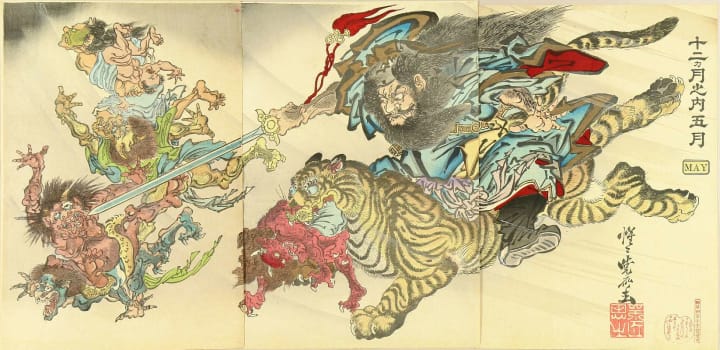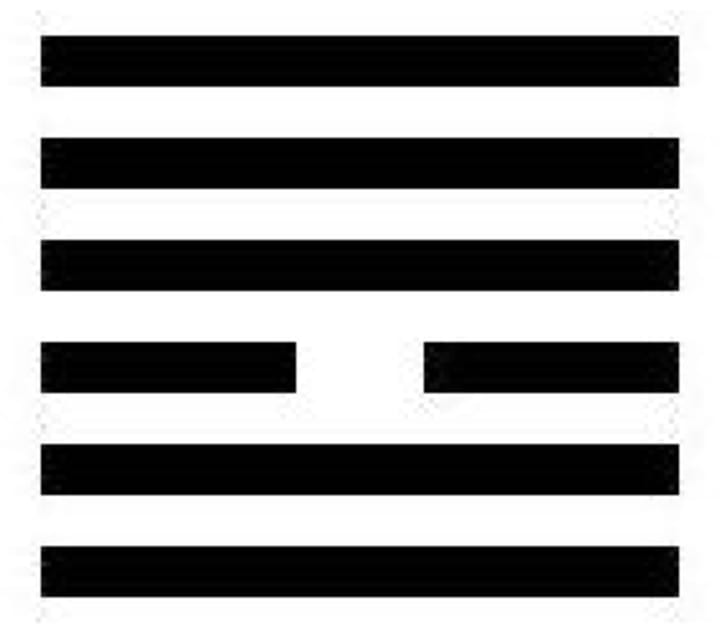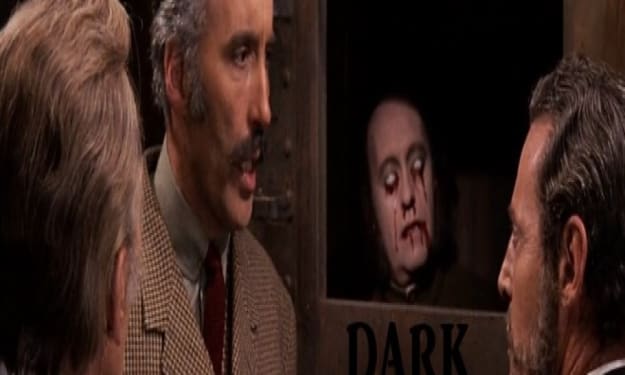Dio, Holy Diver, and Hexagram 10 of the I Ching
Ride the Tiger!
Was Ronnie James Dio a student of ancient Chinese wisdom?
There’s no question that many of the archetypes which are pervasive in Western esoterica surface in Dio’s work. We recognize the Lady of the Lake and the chivalrous knight from Arthurian legend. We come face to face with wizards, witches, dragons, and the wandering fool who might just be a god in disguise. And, of course, we can’t forget, nor should we begrudge, the rainbow!
Though there are many layers to these symbols and the myths on which they are based, these associations are immediately understandable to me as a Westerner. I was immersed in them through an 80s culture that had a faddish obsession with fantasy, and further explored them of my own accord, but one might also argue they resonate on an instinctual level.
So, though all of Dio’s lyrics are to some extent cryptic, and worthy of meditation, few of the symbols have ever made me ask: what the hell does that mean?
Except Holy Diver.
Ride the tiger?
What the hell does that mean?
In this interview, Dio said the song was about a Christ figure on another planet. The song is narrated by the people of that planet, who don’t want to let the Christ figure move on after his brave sacrifice, where he apparently dove into the Midnight Sea and fought a diamond-eyed tiger.
What’s important to note is that the people want to keep the Christ figure to themselves, rather than allow him to move on and help others. Why? Because they are selfish, Dio says.
This implies (though Dio doesn’t say) that the people refuse to learn the hard lesson about cultivating a moral character which would prevent the sort of dire straits into which they fell, and which necessitated the intervention of the savior.
So long as the savior is around, people will refuse to save themselves.
However, this broad interpretation does nothing to explain the particular symbolism Dio chose for this song, which is quite a departure from his usual sword and sorcery fare. As a lover of both Dio and comparative religion, I think I stumbled upon the archetypical associations from which Dio drew this picture of the diamond-eyed Tiger and the courageous Holy Diver.
I could not find any mention by Dio or anyone else about him being a student of the I Ching, the ancient Chinese system of hexagrams which was used for divination, but out of which grew a rich tapestry for contemplation, especially as expounded by the immanent sage, Confucius.
Nevertheless, we do know Dio was an avid lover of mythology, and it stands to reason he would have endeavored to explore cultures other than his own; and even if he did not specifically research the I Ching, it is well known that in the Taoist and other mythologies of Asia and India, there are many depictions of sages riding tigers.

That being said, this is my own analysis, which likely owes more to synchronicity than Dio’s intentions.
As my intention here is not to give a discourse on the I Ching, I must leave it to the casual reader to learn more about it on their own. The gist is this: we have broken lines and unbroken lines arranged in combinations of six, which are supposed to have different symbolic meanings.
The hexagrams are generally interpreted as a pair of trigrams, with the three lines on top being one and the three lines on the bottom the other. The hexagram I will focus on here is number 10 in the series. For a comprehensive rundown of many traditional commentaries, I suggest James DeKorne’s page. It is a treasure trove.
The most important point of identification to note here is this traditional description of the hexagram: "He treads on the tail of a tiger."

The top trigram is three unbroken lines. This is the primordial trigram, representing the creative, the original will, “God”, “Heaven”, and many other cognate concepts. The lower trigram represents water, a lake, a marsh. So this hexagram as a whole might be said to symbolize the heavens above the marsh or lake… or sea? A Midnight Sea maybe?
See?
It is generally considered that the three lower lines of any hexagram represent “the people” and the three upper lines a state of exaltation or exalted parties (“Heaven”) to which the people are appealing or aspiring.
I will comment on the meanings of the respective lines, designating them, from the bottom up, as 10.1, 10.2, etc.
10.1-10.2
In the traditional commentaries, these lines have very similar interpretations, so I grouped them together.
These are “the people” who urge the hero to sacrifice himself out of spiritual grace on their behalf while they obliviously live in the mundane—the “audience”, the “extras”, the onlookers who wring their hands and watch with bated breath but will not approach the mystery, because they are, understandably, too afraid of death.
They only think of themselves, but in the innocent way that children do.
“Oh, what’s becoming of me?”
As they watch the drama between the Holy Diver and the Tiger unfold, they cheer the Diver on, but they are helpless and useless to him.
“Oh, we will pray it’s alright.”
Being the narrators in the song, they do seem to understand, or at least believe, that there is some spiritual significance to unfolding events, but they also perceive danger and push the Diver ahead to “adventure” or “God” or “the greater good” for the sake of sparing themselves.
Even then, they would fear to lose the Diver, and would pray for his safe return so they can continue to have their human shield, rather than seek to emulate his example.
This is the “truth as hard as steel” “between the velvet lies”. The velvet lies are the details of the hero story. The truth is that the rabble uses the hero story and all its charms to promote, compel, or provoke the sacrifice into acting on their behalf.
10.3
The Holy Diver himself. In the I Ching commentaries, this figure tends to be painted as foolishly brave and possibly but not necessarily arrogant, depending on the context of the query.
In some cases, it is extolled that the two yang lines are pushing the lone yin line ahead to implore Heaven, or “the strong”, meaning the rulers of the Empire, for succor/aid or to some other possible confrontation/conclusion. Reference my commentary to lines 10.1-10.2.
I would also call attention to an alternate interpretation of the Bellerophon myth here. Does Bellerophon storm Olympas out of arrogance or as a means to an end—specifically the end of escaping the mundane life of being a shepherd to the people?
10.4-10.5
In the traditional commentaries, these are the lines where the querent is said to be “treading the tail of the tiger.”
This is the Diver’s path.
The Tiger is, due to its proximity, as vulnerable to the people as they are to it.
If he is too vicious, they may seek to harm him. If he is too indulgent, they may seek to tame him, to make him a spectacle in their circus, or otherwise take advantage of him.
As Nietzsche once remarked:
“In order to think fairly of morality, we must put two biological notions in its place: the taming of the wild beasts, and the rearing of a particular species.
The priests of all ages have always pretended that they wished to “improve...” But we, of another persuasion, would laugh if a lion-tamer ever wished to speak to us of his “improved” animals. As a rule, the taming of a beast is only achieved by deteriorating it: even the moral man is not a better man; he is rather a weaker member of his species. But he is less harmful...”
The people want the Diver to be their Tiger-tamer, their ringleader.
So long as the Tiger comports himself up to his lordly status, the rabble will keep a respectable distance, but they’ll never really trust a creature so much more powerful than themselves and will always necessarily be opposed to its presence among them in any fashion that reminds them of their weakness.
This is also true of the relationship between the Holy Diver and the people.
In the traditional commentaries on the hexagram, we’re viewing the journey of the aspirant as he negotiates the path, or treads the tail, of the tiger; but I think this notion of including the deliberations of the Tiger itself in the meaning of the lines is important.
The Tiger as a Great Beast is really a god, and the Diver, an aspirant who, on the surface, seeks to conquer the Beast; but as the mystery unfolds he learns the Tiger is his friend, and will not harm him, but rather save him from harm or capture by the people, who (perhaps unconsciously) resent his bravery and humble sacrifice as much as they do the Tiger’s power.
The trick here is for the Diver and the Tiger to find a way to allay the people’s fears while encouraging them to act on their own behalf, so they won’t be a drain on the powerful and brave, who otherwise have no aversion to protecting them.
In other words, to turn the hero story, and its true purpose, back on the people.
“You can feel his heart
But you know he’s mean.”
In summary: the people admire the nobility of the Tiger but also recognize the danger of his power which is why they seek to push the Diver ahead as a sacrifice.
10.6
The Holy Diver escapes the milieu with the Tiger and can look back and see what the results of his efforts really were.
In Dio’s case, in the song, he laments the people’s seeming inability to act on their own behalf. They never think to be like the Tiger or the Diver. They want everything done for them. They want to feel safe, regardless of the truth of the matter. They want to reap the reward without doing the work.
They go on believing in the hero story and the sacrifice.
But the Holy Diver only pretended to die, and instead moved on with the Tiger.
Dio laments that the people are so selfish, they won’t let the Diver go on to help others… but he also makes it clear that they have no choice. The Diver is gone.
So the people will tell stories about his imminent return until their own weakness destroys them. But they will never see the Diver or the Tiger again, save when they compare them to those rare individuals who separate from the crowd and take their own plunge into the Midnight Sea.

About the Creator
C. Rommial Butler
C. Rommial Butler is a writer, musician and philosopher from Indianapolis, IN. His works can be found online through multiple streaming services and booksellers.
Reader insights
Outstanding
Excellent work. Looking forward to reading more!
Top insights
Excellent storytelling
Original narrative & well developed characters
Heartfelt and relatable
The story invoked strong personal emotions







Comments (7)
That was an interesting take that was deftly explained. Loved it! congrats on Top Story! Dio was an amazing dude.
I saw Dio and Megadeth in 88 for the Dream Evil tour and it was my first experience with his musical genius. This is such an interesting perspective on a truly epic song. Love this!
That gave me much to think of in so many domains! Your Nietzsche citation ties it all together so well. I must explore some of these threads. Congratulations of Top Story!
Although I see mythology, and many such references, I must confess that this went way over my head. But as you say, you leave it to the reader to delve deeper into your story. It is however, beautifully written and well narrated. Congrats on Top story.
“In the city of fallen angels where the ocean meets the sand. You will form a strong alliance and the world’s most awesome band.”
Whoaaaaaa! I was truly so fascinated by your in depth explanation of those lines!
Outstandingly written!!! Interesting and compelling read!!!❤️❤️💕